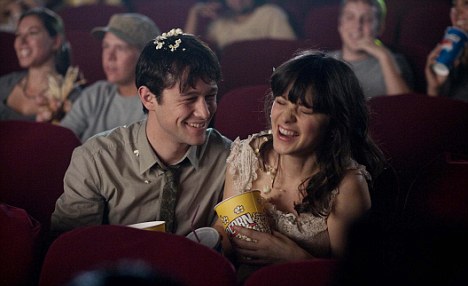The Manic Pixie Dream Girl has often been used as a stock character to brighten the male’s life. (500) Days of Summer tells you that shedding the wrong conditioning is your only hope if you wish for a healthy relationship. Read on to know how.
Moving into a year after the waves of feminism and accountability in art is probably a good time to revisit the archetypes, and tropes used in literature, sexist or internally misogynistic, but easily dismissed on the argument of deeper threads running in its problematic nature. To question the literature and those tropes, it is significant to remember and to remind oneself that no literature or art is ever devoid, or in isolation of, a cultural baggage. So, when one talks about the girl who is chirpy, fun, happy-go-lucky, caring, and a thousand other positive things the boy is not, it should not be forgotten that this is how women were supposed to be.
The famous ‘Manic Pixie Dream Girl’ (https://tvtropes.org/pmwiki/pmwiki.php/Main/ManicPixieDreamGirl) trope has existed in literature for as long as the male gaze, and the male voice, has been the dominant one, which can be traced back to, well, forever. But it was only in the 21st century that the trope received its fancy christening, and became the talk of the town for art enthusiasts to dissect and analyse. Credited with the nomenclature, Nathan Rabin used the term in his review of the 2005-film Elizabethtown. The later usage of the term and the trope made Rabin distance himself from further association. According to Rabin, this originally stock character “exists solely in the fevered imaginations of sensitive writer-directors to teach broodingly soulful young men to embrace life and its infinite mysteries.”
There are many examples of the trope, but the one that stands out the most in the 21st century memory for a rather subversive portrayal, and yet its apt representation, of the trope is found in (500) Days of Summer. YouTube channel- ‘Movies Under The Surface’- has deconstructed the trope and critically analysed its utilisation in the film, revealing that the character of Summer Finn, played by Zooey Deschanel, is only viewed through Tom Hansen’s (played by Joseph Gordon-Levitt) lens, and the character of Summer changes its hues completely according to the way she is associated with the male protagonist of the story. The interesting subversion is in the very manner of how the story ultimately pans out.
Gordon-Levitt’s character, Tom, looks at Summer in a fashion that shows his expectations to her of being able to free him from his greeting-card-writing, discontent existence. His bedroom eyes, dreamy shots of Summer in his mind, and the growth of his feelings towards her is in a unidirectional manner, focusing on how she makes him feel about his own self. There is no transaction of mutual affection, or even expectations for that matter, portrayed in the film. But the film does not endorse this point of view in a twenty-first century man looking for love.
Summer is not a Manic Pixie Dream Girl in reality; she is that from the perspective of Tom, and that is the major portion of the film. She does have disappointments and goals of her own, as she reveals in an initial sequence in the bar, but the interpretation of those dreams and ambitions is again from a lens neither objective in any sense, nor her own. This is not a love healthy enough to last in a committed relationship, where one person only considers the other as their extension. In heterosexual relationships, with our cultural conditioning, the burden of having to live half an existence is usually expected to fall upon women. Tom is, thus, a guy brought up to believe that a woman is the way ‘to bring colour’ to his life. Quite literally, the colour-schemes of the movie frames are relatively vibrant when Tom and Summer are happy together, from his perspective again.
What makes a revolution out of this romantic film is that the male voice is not concluded to be the correct, or the only, voice. The inevitability of Tom’s flaws in believing that the love of his life has no life of her own, no individuality of her person to cater to, is not romanticised in the tone of the film. The non-linear structure of the film, built around how Tom revisits his days and memories with Summer, is a literary device to depict the non-linear manner of his growth.
The movie is not so much about the togetherness, as it is about the ending to it. The break-up is not shown in a manner propagated by Indian cinema, and many other communities of cinema, where one party obsesses over the other till they are back together in their toxic proximity. It is portrayed from Tom’s eyes, in the utter grit of its naked helplessness. Tom and Summer end because of a lot of reasons, but they cannot end up together because their love would always be tainted by the beginning with Tom’s “you complete me” baggage. In an era where it is often easy to get a debate started on political correctness, the movie chooses its honesty. It does not deny that men have been brought up with the hopes of falling for their Manic Pixie Dream Girls, but it ends up being firm on the rationale that accepting the trope and its sexist threads is not the way you get to keep the relationship alive, or the girl happy.
Image Courtesy: Still from (500) Days of Summer
Image Caption: Tom laughs because he finds Summer to be the source of happiness in his life.
Anushree Joshi




Comments are closed.